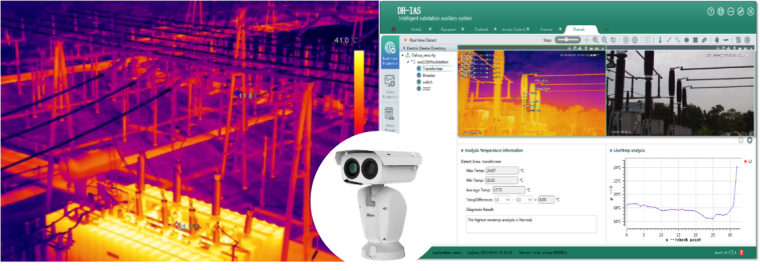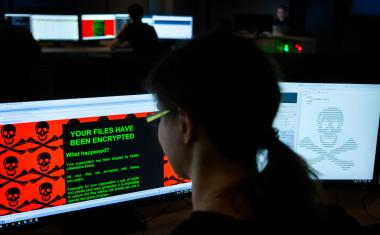Thermal Imaging to Prevent Threats
Historical Background of Thermal Imaging Like many cutting-edge technologies, thermal imaging was first developed for military use in the 1950s and 1960s when the US successfully...

Historical Background of Thermal Imaging
Like many cutting-edge technologies, thermal imaging was first developed for military use in the 1950s and 1960s when the US successfully introduced cooled infrared detectors onto missiles. Infrared detectors eventually evolved into thermal imaging technology, which has made its way into non-military applications, and is now widely used in various areas such as industrial inspections, medical diagnoses, and in satellites. An important milestone in the advancement of this technology was the invention of uncooled infrared detectors, which enabled cheaper and easier to maintain thermal imaging products to make their way to the general market for use in applications including security surveillance, forest fire prevention, and power plant monitoring.
Conventional surveillance cameras are already very capable of capturing video in the daytime or in well-lit areas. However, when faced with poorly lit areas or at night, the video capturing abilities of these cameras begin to diminish as sensors must compensate for the lack of light by increasing sensitivity, thus producing a noisy image, if one is produced at all. Since clear day and night monitoring is an important benchmark in assessing a surveillance system’s effectiveness, thermal imaging devices present a clear advantage in their ability to convert heat energy into an image visible to the human eye.
Leveraging its experience in camera image analysis and intelligent algorithms, Dahua Technology has developed thermal imaging devices with innovative functions that balance visible light with infrared, enabling the ability to effectively monitor an area under all lighting conditions. In addition, these functions include advanced capabilities such as intelligent temperature measurement, which further extends the scope of surveillance applications such as in detecting forest fires or quickly checking for passengers with high fevers at international airports.
The following three applications demonstrate the widespread capabilities of thermal imaging:
Border Security
Border security concerns not only the security of the country, but also the safety of citizens and their property. Traditional border monitoring systems still face many imperfections: First, a relatively small amount of patrols are employed to guard large areas, leading to partial gaps in coverage. In areas where cameras are used, there are often blind spots in their line of sight, such as tall grass or brush, or places beyond their range. Finally, when emergencies occur, responses can be slow and inefficient due to the scattered nature of guards and the need for manually sounding alarms.
Dahua has created a comprehensive solution to tackle the challenges of border surveillance. For example, take a 100km section of essentially unlit, wild border terrain. A thermal dome camera (TPC-SD8320) with 30x zoom can be installed every 1km. It can quickly detect objects using thermal imaging and then confirm threats using visible light images. In this way, night monitoring difficulties can be completely overcome with infrared light. In total, just100 cameras alternately placed on both sides of the border are necessary to provide full coverage.
Now, instead of a number of patrols working alone outside over a large area, a small team of workers can manage the border from a command center, which features advanced automated functions. The center is outfitted with an e-map, which shows the location and current sight line of each camera, allowing border workers to assess surveillance coverage in real-time. When a camera detects someone entering a restricted area, it will automatically trigger an alarm while continuing to track the target. Staff can then alert the intruder and warn them with sirens. If needed, a team can then be quickly dispatched to confront the intruder with help from the command center. In addition, intelligent route patrol allows operators to configure cameras to follow a set patrol route according to requirements and the terrain, decreasing the need for manual control.
Forest Fire Prevention
With the potential of having catastrophic consequences, fires are the greatest danger to a forest. Efforts to prevent forest fires have been explored over the years, but several difficulties still exist - The area of the forest is disproportionately large to the limited number of patrols who move relatively slowly and are equipped with only their eyes, from which a fire source is very likely to escape detection, especially when smokeless. To effectively prevent forest fires, new technologies that can function more accurately than humans are needed.
Dahua’s intelligent forest fire monitoring system automatically monitors the entire forest area, conducting intelligent patrols. If a blaze begins, the system will automatically trigger an alarm via a high precision intelligent algorithm which uses laser positioning to accurately locate the source of the fire.
Substation Inspection
As power transmission hubs, substations must maintain a safe and stable state at all times. Manual patrol alone is not enough since malfunctions can happen in an instant and may not be immediately detected, or a patrol may not be able to see silent breakdowns waiting to occur.
Fortunately, new devices allow us to use technology in order to detect problems. Dahua has developed an intelligent substation monitoring system which provides intelligent patrol features complete with a report after each round of patrolling. In other words, it provides users with real-time information about substation equipment in a way that is much more efficient, saving time and labor. Furthermore, it allows humans and machines to work together and take advantage of their respective strengths. If the temperature of equipment or part of the station exceeds a preset limit, the system will automatically trigger an alarm alerting management.
Summary
If it is presumed that conventional monitoring methods are sufficient enough in dealing with threats, a tremendous amount of lives and possessions would be put at risk. Cutting-edge technologies are necessary to effectively prevent and respond to threats in the shortest duration possible. Dahua thermal imaging devices provide the tools required for ensuring security in a number of applications. With a mission of “Enabling a safer society and smarter living”, Dahua will continue to focus on “Innovation, Quality, and Service” to serve partners and customers around the world.













